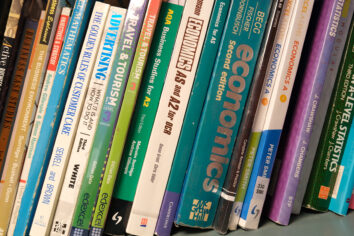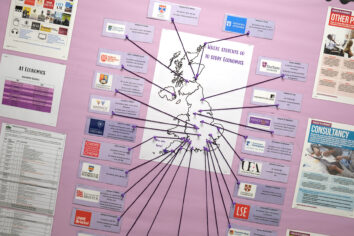New students starting in September: You can find more information about Induction days and submitting your GCSE results in our Start of Year Guide.
WHY CHOOSE THIS COURSE?
Want to know about the cost-of-living crisis? Interested in how governments use economic policy to respond to climate change? Curious about the long-term economic impact of Brexit? If so, then this is the subject to study! Economics encompasses every aspect of our lives, linking historical economic events to current and future problems.
It develops an understanding of the world around us that is as valuable as it is interesting. Whether it is solving global inequality and poverty or considering how fiscal and monetary policy can stimulate economic growth, the subject looks to embrace real world issues.
Economics has connections to many other subjects such as Politics, Geography, History, Business, Psychology and Statistics and is highly valued by universities.
Apply for this course
Start date: 08/09/2025
TOP COURSE HIGHLIGHTS
Highly regarded by universities
High profile speaker
Virtual work placement opportunities
Highly regarded by employers

link your learning to real scenarios
Learn about key economic theory and concepts and apply them to real world situations.

highly transferable skills
Contemporary focused subject which focuses on developing highly transferable skills.

wider reading and research
Develop an awareness of economic policies and trends in the global economy through wider reading and research projects in Year 2. This is a real opportunity to learn about specific economic issues in significant depth, developing invaluable research skills which will be beneficial for future academic and professional routes.
WHAT WILL I LEARN?
In year one the course explores the nature of markets and their role in allocating resources in a modern economy. The central role of the government and market failure are also investigated.
Next, you will examine the performance of the UK economy, levels of macroeconomic activity and how they are determined and managed using national and international indicators and policies.
In year two the focus is on the labour market and business structures. It also covers the role of the government in maximising economic performance.
Finally, the performance of the national and global economy is studied which gives both context and a framework for economic analysis in an integrated and globalised world.
Year 1 Study
Theme 1: Introduction to markets and market failure
The aim of this part of the subject is to introduce you to the principles and method of investigation in Economics. You will study the basic economic problem, the role of markets and government intervention. The concepts of supply and demand will be utilised to derive prices in a market economy. Government intervention will be investigated when markets fail to deliver a satisfactory outcome. You will use case studies to examine contemporary issues facing policy makers.
Theme 2: The UK economy performance and policies
Here you will explore the nature of the total UK economy. You will focus on how levels of income, employment, inflation, and balance of payments are determined. You will investigate the formulation of government economic policy and learn how economies change and develop over time. Here you will gain an understanding of many of today’s front page news items such as the post-Brexit trade deals, the cost-of-living crisis and government policy on issues such as green energy and migration.
Year 2 Study
Theme 3: Markets and business behaviour
The aim of this area of study is to build on the subject content covered in year 1. Here you will study business growth and performance, market structures, the operation of the labour market and government intervention. You will explore a range of business scenarios and develop analytical tools to investigate behaviour and performance. You will investigate wage patterns and levels together with legal and political influences on the labour market.
Theme 4: The national and global economy
The aim of this area of study is to provide a conceptual framework for the understanding, analysis, and evaluation of overall macroeconomic performance in national, regional, and global contexts. Some of the key topics you will cover are comparative economic performance indicators and policies, trade and integration, the financial sector, development and sustainability and the economics of globalisation. Here you will learn more about exchange rates, interest rates, unemployment, inflation, and other economic concepts relating to growth in the world economy.
Microeconomics and macroeconomics
The final Economics paper draws on topics you have learnt from across all four themes. Here you will be engaged with data response questions and open response questions where knowledge and understanding are tested. No new material is introduced in this paper, but a full appreciation of the main themes and issues covered throughout the programme is required for success.
WHERE WILL IT TAKE ME?
Career choices: Economist, Financial Consultant, Investment Analyst, Business Analyst and Actuary.
HE courses; Economics, PPE (Philosophy, Politics and Economics), Politics & International Development.
assessment arrangements
Paper 1 – Markets and business behaviour {Theme 1 and 3} – microeconomic content – worth 35% of the total qualification. The paper is broken down into three sections with Section A including multiple choice and short answer questions, Section B has one data response question broken down into a number of parts and Section C has a choice of extended open-response questions. Duration is 2 hours and 100 marks available.
Paper 2 – The national and global economy {Theme 2 and 4} – macroeconomic content, worth 35% of the total qualification. The paper is split into three sections in a similar format to Paper 1. Duration is 2 hours and 100 marks available.
Paper 3 – Microeconomics and macroeconomics {All 4 themes} worth 30% of the total qualification. The paper comprises two sections with each having a data response question broken down into several parts. Duration is 2 hours and 100 marks available.
Achievement in this subject is dependent upon excellent attendance, punctuality, and effort. Lectures will be a friendly, lively atmosphere, using a variety of assessment methods. Contribution to class debates and discussion is highly valued and encouraged.
Regular written assessments will be conducted either as homework or under timed conditions in class and detailed feedback is given to enhance progress. We also run mock examinations in each paper in advance of the final examinations and review student performance in 1:1 sessions with tutors.
entry requirements
Study on this course requires a minimum of 5 GCSEs at Grade 4 or above, to include English or a Humanities subject at Grade 6 and Maths at Grade 5 or above.
information and support
We encourage all students to read widely and conduct their own research into Economics. A wide variety of electronic resource material is available as well as a well-stocked Learning Centre.
Contacts: nigelcarr@truro-penwith.ac.uk
For more information follow @tcbatle on Instagram, Facebook and on X.
Meet the staff, tour the campus and find out about life as a student at one of the best colleges in the country.








